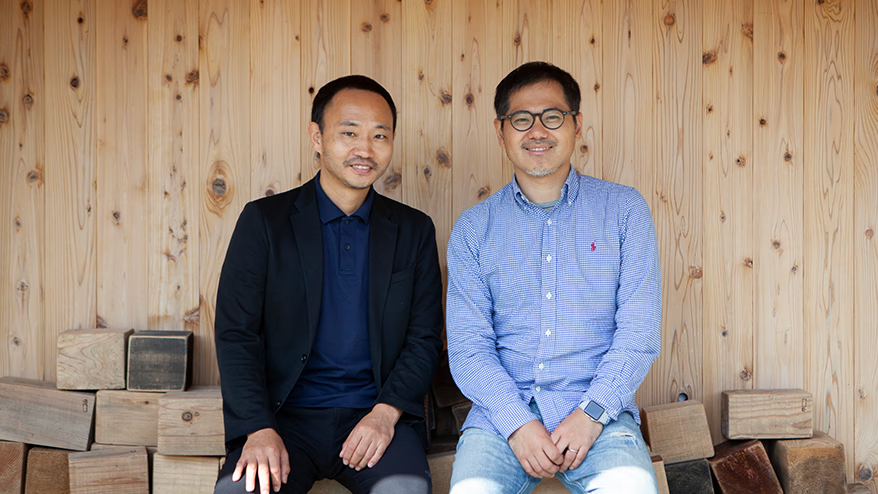戦略コンサルティングやクリエイティブディレクション、文化事業プロデュースなど、多様な領域においてご活躍中で、オーストリアのリンツで開催されているアートとテクノロジーの祭典、アルスエレクトロニカの日本での第一人者でもある鷲尾和彦さん。
前編では、「生活の質を届けることの重要性」や「文化と街は地続き」など、街づくりの際に忘れてはならないことをうかがいました。後編では、リンツと神山の共通点や、鷲尾さんの夢についてお聞きします。鷲尾さんが成し遂げたいこととは…? 神山のフードハブ・プロジェクト(以下フードハブ)の食堂、かま屋でお話をうかがいました。
(インタビュー構成:田中亜希)
-
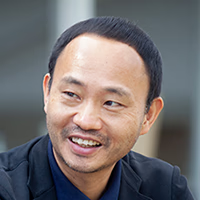
-
鷲尾和彦さんプロフィール:
クリエイティブ・プロデューサー(株式会社博報堂)
戦略コンサルティング、クリエイティブ・ディレクション、文化事業の領域で、数多くの企業や地方自治体とのプロジェクトに従事。プリ・アルスエレクトロニカ賞「デジタルコミュニティ」「ネクストアイデア」部門審査員(2014〜2015年)。主な著書に『共感ブランディング』(講談社)、『アルスエレクトロニカの挑戦~なぜオーストリアの地方都市で行われるアートフェスティバルに、世界中から人々が集まるのか』(学芸出版社)等。現在、東京大学大学院工学系研究科都市工学専攻「地域デザイン研究室」にも在籍。
モノラルな価値の追求は、結局「勝ち負け」だけになってしまう
鷲尾
この「かま屋」は、この土地だからこそ生まれた場所ですよね。これからは、それが益々大切なことになっていくと思っています。素敵だなって思います。
林
ありがとうございます。
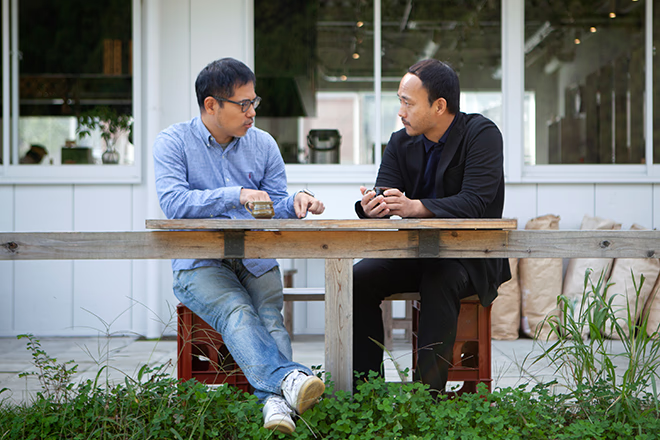
左:代表の林、右:鷲尾さん。 神山町でフードハブが手がける食堂、かま屋にてインタビューをしました
鷲尾
情報化が可能なもの、つまり、世界中どこにいても手に入れられるもの、どこでも同じようにつくれるものって、それはそれで便利とか安いという軸で価値があるけど、それだけが唯一の価値ではないのは確かだし。モノラルな価値の追求は、結局、突き詰めると「勝ち負け」になっちゃうんですよね。
極端にいえば、勝者一人とそれ以外の大勢多数。そしてそこには「格差」が生まれます。それだけでは持続性がないなということに本能的にも気づいている人はたくさんいると思います。モノサスさんが神山町にサテライトオフィスを置くことでデュアルな体制を作ったり、“地産地食”を軸に、神山の農業と食文化を次世代につないで行く“フードハブ”にチャレンジしていることは、多分本能の部分もあるのでは? そんな風に林さんを見ていて感じます。
林
そう言っていただけると嬉しいです。ただ、やはり課題はたくさんあります。僕たちが神山で育てている作物の中にも収益化しやすい作物と、そうでない作物があります。でも収益が出やすいかどうかだけではなく、育てたい作物、育てるべき作物というのもあります。経済合理性だけでなく、食文化を受け継いでいくために必要な作物かどうかという「もうひとつの軸」が必要だと思って活動をしています。
そういう経済面のことを考えると、オーストリアは予算の使い方が大胆だなぁと。今回のツアーでフォアアールベルク州というアルプス地方の小さな自治体の話を聞きに言ったチームから話を聞いたところ、庁舎が生活圏の中心になっているとのことでした。庁舎の整備に予算をかけている分、おそらく、他のところへの出費を抑えているんでしょうね。農家の収入の約80%は補助金だという地域もあるのだとか。そんなに潤沢な予算がある自治体ではないはずなのに、そういう判断をしているんです。使い方のバランス感覚が日本とは違うなぁと感じました。良し悪しはわかりませんが。
時間軸をしっかりと考えたうえで、
自分たちのアイデンティティを大切にすること
鷲尾
僕もそれを見て、無駄なものを作っていないって感じました。だから風景も、家のまわりも、部屋の中もとてもすっきりしていて美しく感じました。今、本当に必要なものは何か、これから残すべきものは何かってことを、ちゃんと考えているってことなんだと思います。ヨーロッパの都市経営を見ていると、社会福祉、都市計画、文化、産業、環境など、まず公務員である前に、各領域のプロフェッショナルが担っている。博士号を持っている人がやっている場合が多い。その上で、各部門のディレクターが合理的にディスカッションしている。それが普通なんです。
独裁や腐敗にまみれた時期もあったと思うけど、それではうまくいかないことに気づいた街が今は多いんじゃないでしょうか。「この行事は経済合理性が弱いかもしれないけど、おじいちゃんの時代からやっていることだから、これをなくすと自分たちのアイデンティティはなくなるよね」とか、そういう議論も、むしろ実はこうした合理的な議論の上でなされているんです。時間軸をしっかりと持った上で、経済的な効果を導き出すためのプロセスやポートフォリオがプランニングがされている。もちろん、人がやることだから上手くいかないこともあるだろうけど。
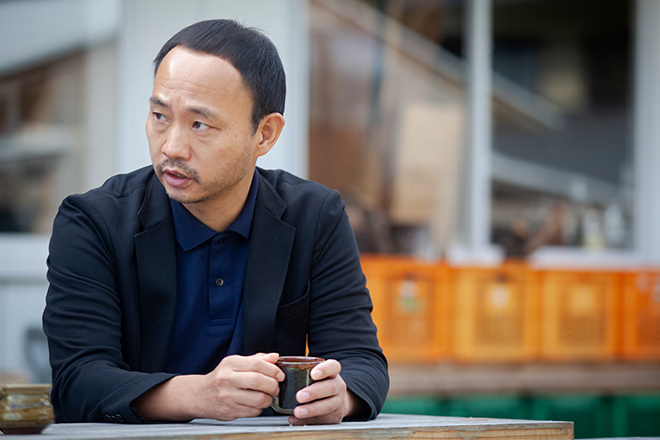
林
なるほど、そういうことなんですね。
鷲尾
たとえば、ある街の中央広場に古い市庁舎があるとして、「それをなくして新しくスーパーやデパートを建てるほうがたくさんの消費者が来て儲かるからいいよね」という意見も民間業者を中心に当然たくさん出てくるわけです。しかし、その一方で「いや、そこに市庁舎があることで、住んでいる人はこの町への愛着を持ち続けてくれるから、結果的に地域が強くなる」という長い目でみた発想もある。リンツ市の場合だと、後者のような考え方を、かなり厳密な都市計画制度を通して行政が街の方針にしていますね。それが行政の仕事なんですが。
歴史や風土の記憶は、いったん分断されると取り返せません。どんどん忘れられてしまう。市庁舎がある日突然スーパーになったら、10年後、子どもたちは「ここに市庁舎があった」という記憶はもう失くしてしまっているでしょう。ただでさえ人が減っていく時代に、その場所の記憶と断絶された人が増えてしまうのは長い目で見たときに果たしてどうなのか? コミュニティや地域の力を損ねるのではないか? そこはとても大切な議論のポイントだと思います。
林
歴史や風土の記憶を分断するのはよくないという点については、ヨーロッパの都市は過去に学んでいるんでしょうね。古代のギリシャやローマの文化を復興しようとしたルネサンスという運動は、14世紀のときにイタリアで始まったようですが、ヨーロッパはそれまで800年ほど暗黒時代でした。社会が乱れて伝染病のペストが流行したり、世界史の教科書にあまり出てこないような時代。ヨーロッパの人々は、800年間にわたってある意味では文化の断絶に近い状態があったと捉えているようです。だから、暗黒時代を過ぎたときは、800年前に戻らないと文化を再開できなかったと。
鷲尾
ヨーロッパ各国は、ギリシャという国に対する暗黙のリスペクトがあると聞きました。人間復興という欧州文化のルーツがあるからだと。フランスやドイツのほうが文化的にも進んでいると思われているかもしれないけれど。
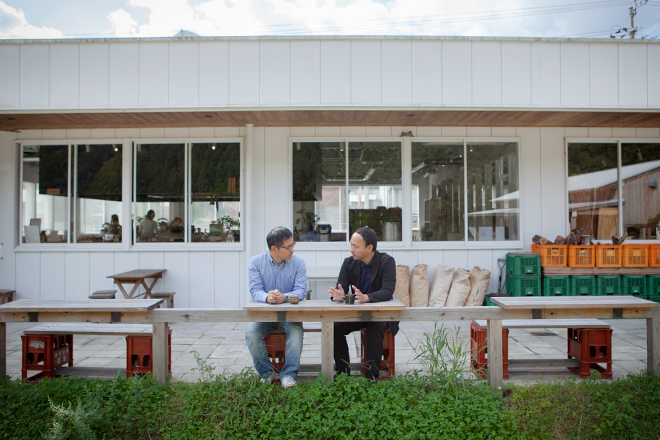
林
ヨーロッパは、文化の断絶に対する反省があるのかもしれませんね。
鷲尾
きっとそう思いますね。その点は非常に興味深いです。リンツ市も実はアドルフ・ヒトラーの故郷で、この町が近代化したのもナチスがここに軍事産業を作ったからです。そしてその後、重工業都市としての斜陽化も生活環境の劣化も文化的なダメージも経験しています。アート&テクノロジーで未来志向の都市と宣言しながらも、その裏ではこうした過去の歴史を科学的に検証し、歴史の負の部分を直視しようとしてきました。
リンツにも僕らには理解しようのない社会の闇というものがきっとあったと思います。でも、闇をちゃんと見ることで、それを「光」に転換させようとしてきた。やっぱり歴史や記憶を分断させないわけです。そうでないと全部イチからやり直さなくてはならない。土地の力を活かせないから、こんな無駄なことはない。
神山の魅力は「オープンネス」
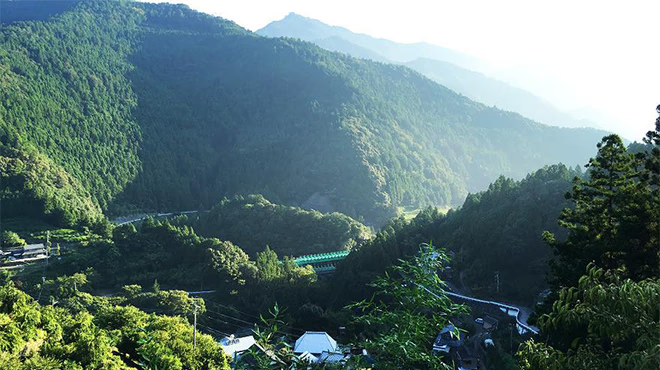
林
これは、僕が勝手に思っていることなのですが、鷲尾さんは、神山に興味をもって下さっていますよね…(笑)。
鷲尾
もちろんです!
林
どのあたりが興味深い部分なのでしょう?
鷲尾
この春に神山町にお邪魔したときに、「まちを将来世代につなぐプロジェクト」(つなプロ)の町民報告会に参加させていただきました。正直、すごく感動したんです。「人が可能性を感じられる状況をつくる」というのが神山町の創生戦略というのもすごいけど、さらに創生戦略を実現する手段やプロセスを、町役場と住民、新住民も一緒になって議論しあってつくっている。「フードハブ・プロジェクト」もそうですよね。町民報告会の熱気もすごかった。見たことない光景でした。たくさんのことを学ばせていただいたと思って感謝しています。
林
それは嬉しいです。
鷲尾
そういう風に見てみると、先ほど話したようなヨーロッパの都市の運営にも共通しているところが多いかもしれませんね。僕もお世話になっていますが、神山町には、NPOグリーンバレーの大南信也さんのように、自分が育った土地に愛着をもちながらも開かれた感覚をもっているキーパーソンがいらっしゃいますよね。その人たちが突破口になって、町のなかに外からの新しい思考を取り入れようとされてきた歴史があります。外から受ける新しい刺激に対して、素直に受け取り、面白いといえる「オープンネス」があるように感じています。そういう人は、勝ち負けよりも、もっと楽しいことがあるのを知っている人たちです。
林
そうですね、よくわかります。
鷲尾
僕も関西の小さな町の出身ですけれど、神山町もきっとそうで、本当はクローズドな部分って多いって思うんです。でもそれを先駆者たちは柔らかく揉みほぐそうとされてきた。環境活動やアーティスト・イン・レジデンスを長年続けてこられたのも、観光客誘致ではなく、この町をもっと可能性のある場所にしていこうという発想からですよね。それがまさに文化になって、その先にモノサスさんがサテライトオフィスをつくったり、フードハブ・プロジェクトが生まれたりしているんじゃないですか。
林
その通りだと思います。
鷲尾
今、神山つなぐ公社には、テーマごとにプロフェッショナルなメンバーがいらっしゃいますよね。外から移住してこられた方々が地域の方々と一緒になって働いていらっしゃる。そのあたりの「設計思想」ってさっきのヨーロッパの都市とも近いと思うんです。合理的ですよね。モノサスさんもすごく重要な役割があると思います。これからのお仕事もすごく楽しみです。
「ここには生活の質があるからここで働きたい。」
それは、正直な気持ち
鷲尾
そういう町がどんどん増えてほしいなって思いますね。でないと、ちょっと悔しいじゃないですか、ヨーロッパに対しても。
林
悔しい?
鷲尾
そう、悔しいなあって。生活の質が高いなあって思うんですよね。リンツもオーストリアの田舎の村も、別に豪華でもなんでもないんだけど。無駄がなくて、丁寧で、生活していくために必要な基本的スペックが高い。若い人たちが「ここには生活の質があるからここで働きたい」と言っている点もいいなあと思う。それってすごく正直な声だと思う。
リンツの場合は、日常の基本スペックの高い質があった上で、世界の先端知にアクセスできる機能をアートフェスティバルというツールを使って手に入れたわけです。世界の人が向こうからオーストリアの地方都市にわざわざ来てくれるわけですよ。こういうことを、どうすれば日本が取り戻せるかって思いますね。本来、世界のどこよりも日本ってそういう国だったんだから。

林
鷲尾さんは今後どういうことをやっていきたいんですか?
鷲尾
これからは、これまでの50年とは全く違うわけです。人は減っていく。これまでのやり方では格差が広がる、それは社会が分断するってことですよね。とても切実な問題だと思います。大切なことなので繰り返しますが、これからはその土地や風土に根ざした独自の価値、文化的な価値を追求していくという方向性にどれだけ勇気をもって踏み出せるかにかかっていると思います。
「テロワール」ですよね、まさに。そして、街にも、企業にも、人の営みがあるところにはきっと「テロワール」ってあるはずなんです。そんな方向性に進んで行こうとする人たちと一緒に仕事がしたいですね。「ここが素敵ですよ」「こんなことをしてみませんか」って話しながら、一緒に夢を大きく育てたい。一つでも、二つでも、そんな勇気ある人たちの役に立つことができればと願っています。
林
最後に、どんなことでもいいので個人的なプランがあれば、ぜひお聞きしたいです。
鷲尾
僕には小さい娘たちがいるんです。彼女たちが大人になったときって、世界はどんな光景になっているんだろう。最近はいつもそのことを考えていますね。自分がこれまでに見聞してきたことを沢山話して聞かせてあげたい。沢山面白い話をしてあげたい。それが「学校」なのか、町づくりなのかわからないけど、何かそんな「場所」をいつかつくりたいなっていう夢があるんです。
鷲尾さんへ
鷲尾さんにとって「訳もなく惹かれる存在」であり続けているリンツ、
そしてアルス・エレクトロニカという存在は、鷲尾さんと一緒に
リンツを巡ったことで、私にとっても「訳もなく惹かれる存在」へとなっていきました。旅をしながら「なんで惹かれるんだろう」という議論をするうちに、
リンツと神山・・・、国も、文化も、規模も全く違う町ではあるけれども、
鷲尾さんも私も、なにか共通したところに惹かれているような気がして、
きちんと鷲尾さんのお話を聞いてみたくなりました。そして、実際にお話を聞いていくうちに、
だんだんと鷲尾さんが今後やってみたいことを聞いてみたくなり、
「これは多分、鷲尾さんも答えをもっていらっしゃらないんじゃないか」
と思いながらも、インタビューの最後にお聞きしてみました。鷲尾さんのリンツについての深い洞察を聞くにつけ、
客観的な分析以上の「熱」を私はいつも感じていました。
それを繰り返していくうちに「この熱はどこに向かっていくのだろう・・・」
という興味も同時にわいてきたのです。もちろん「神山に向かってくれるといいなぁ」という無責任な期待もありますが(笑)
私が神山に言い知れぬ魅力を感じて通い始めたのが、2012年のこと。
それから6年が経ち、当時からは想像できない状況がたくさん生まれつつあります。
でも、この状況があるのも神山というフィールドがあるからこそ。リンツ、そしてアルス・エレクトロニカは、鷲尾さんにとって
もちろんフィールドのひとつですが、
「より身近なフィールドを得たとき、鷲尾さんはどんなことを始めるのだろう」
ということを想像して、勝手にワクワクしはじめています。これからも、東京、神山、リンツで、鷲尾さんの熱を聞かせていただいたり、
もしかしたら何か一緒にできることを探りながら、楽しい時間を
ともにさせていただきたいと思っています。また暖かくなったら、ゆっくりご家族で神山にいらっしゃってください。
林 隆宏
